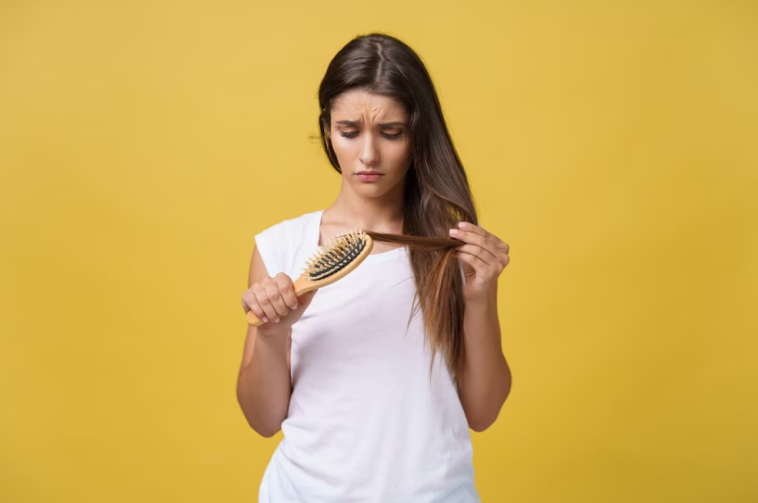You’re not the only person who has observed that your ponytail looks a little thinner or that there are more hairs in the comb than usual. Hair loss is a concern for both men and women, as it has effects that go beyond the physical and usually affect how we think about ourselves.
Understanding the causes of hair thinning is the first step in regaining control over the health of your hair. It’s a key place to begin whether your goal is to stop further thinning or to grow that dense hair back. So let’s talk about the underlying causes.
The cycle of hair growth:
To determine why your hair might be thinning, it is important to know about the hair development cycle. We typically imagine hair growth as an ongoing procedure in which each strand lengthens every day. The process of developing hair, on the other hand, is far more complex and involves several stages.
The three phases that complete the cycle of hair development are anagen (growing), catagen (transition), and telogen (resting).
Anagen Phase 1
Your hair is actively growing at this time. The maximum length of your hair can be achieved during this time, which can last between two and seven years.
Catagen Phase 2
The two to three week transition period is a short amount of time. During this phase, the hair follicle constricts and splits from the dermal papilla of the scalp, which feeds the hair nutrition.
Telogen Phase 3
About three months pass during the telogen phase, also referred to as the resting phase. This stage does not involve any growth of the hair rather, the hair is still attached to the follicle as the area below it starts to develop new hair. Once this new hair has grown entirely, the old hair is pushed out, and the cycle is repeated.
Note: Generally speaking, 90% of our hair is in the anagen phase, and 10% is in the telogen phase. This is why it is very normal to lose about 50 and 100 hair strands per day. However, if you’re losing much more hair than that, it may indicate that something is preventing your body from going through its typical cycle of hair growth.
Hair thinning causes include:
The thinning of hair is a distressing condition. It can be quite painful and confusing when you don’t understand why it’s happening since it may feel like you’re losing a part of your identity. To help you better understand what might be going on, we’ve compiled a list of the most common underlying reasons for hair thinning.
1. Lack of access to food
Insufficient consumption or inadequate utilization of vital vitamins and minerals might result in hair thinning. You require iron, zinc, vitamin D, and B vitamins for good hair growth. Problems like telogen effluvium, which results in blatant thinning and accelerated shedding, can arise when these are absent.
2. Unbalanced hormones
This is among the primary causes of hair thinning in women. Changes in hormone levels, particularly those that take place during pregnancy, menopause, or as a consequence of conditions like PCOS, can cause hair thinning. Sometimes, hormonal changes might hasten the onset of gray hair.
3. Androgenetic alopecia
This is a common genetic condition that affects both men and women and is referred to as male-pattern and female-pattern baldness. Women who have this syndrome may experience generalized scalp thinning.
4. Stress
Excessive levels of stress, whether mental or physical, can lead to conditions like telogen effluvium and alopecia areata, where hair thinning is apparent.
5. The condition of the scalp
Some of the conditions that can injure or disturb the environment on the scalp include seborrheic dermatitis, psoriasis, and fungal infections. These conditions can reduce the development of hair, change hair color, and make hair appear thin.
6. Autoimmune Conditions
Diseases like lupus, alopecia areata, and many more can cause hair thinning and loss when the body’s immune system incorrectly targets hair follicles.
7. The Role of Age
Our hair follicles naturally grow slower, less powerful, and thinner as we get older. Everyone is affected by this usual part of aging to some level.
8. Using heat and chemicals to style hair
Splitting and thinning of the hair strands can be caused by the exterior damage that extreme heat styling, chemical treatments, and particular hairstyles can cause.
9. Thyroid Problems
Both hypothyroidism (an underactive thyroid) and hyperthyroidism (an overactive thyroid) may trigger hair to thin because they interfere with the hair development cycle.
10. Medicines and medical treatments
Many kinds of medicines, especially those used for cancer, arthritis, depression, heart issues, and high blood pressure, can cause hair to thin and fall out.
11. Extreme Dieting and Weight Loss
Quick weight reduction, especially when the cause is excessive dieting or a dietary problem, can result in vitamin deficiencies that slow down hair development and thin the hair.
How can hair thinning be controlled?
Even though there isn’t a quick fix to stop hair from thinning, there are several things that you can implement to stop hair loss and promote thicker, healthier hair. Let’s examine a few of these techniques.
Healthy Diet:
The saying “you are what you eat” is particularly accurate when it concerns hair health. Diets high in nutrients including lean meats, fish, fruits, vegetables, whole grains, and healthy fats help provide your hair with the essential vitamins and minerals. These nutrients and vitamins may assist in grey hair coverage and are necessary for good health.
Hydrated body:
Water is necessary for maintaining beautiful hair, as well as for your overall health. Controlling circulation is made easier by staying hydrated. It encourages hair development by nourishing the hair follicle.
Frequent Scalp Massages:
Massages of the scalp frequently can help to increase blood circulation, which nourishes the roots and promotes hair growth.
Reduced stress:
Continuous stress may lead to thinning hair. you can manage your stress levels by practicing techniques that relieve stress like yoga, mindfulness, deep breathing, or any other interesting stress-relieving activity.
Gently treat hair:
When brushing and styling your hair, be careful how you treat it. Breaking and thinning might occur as a result of extreme pulling or straining.




